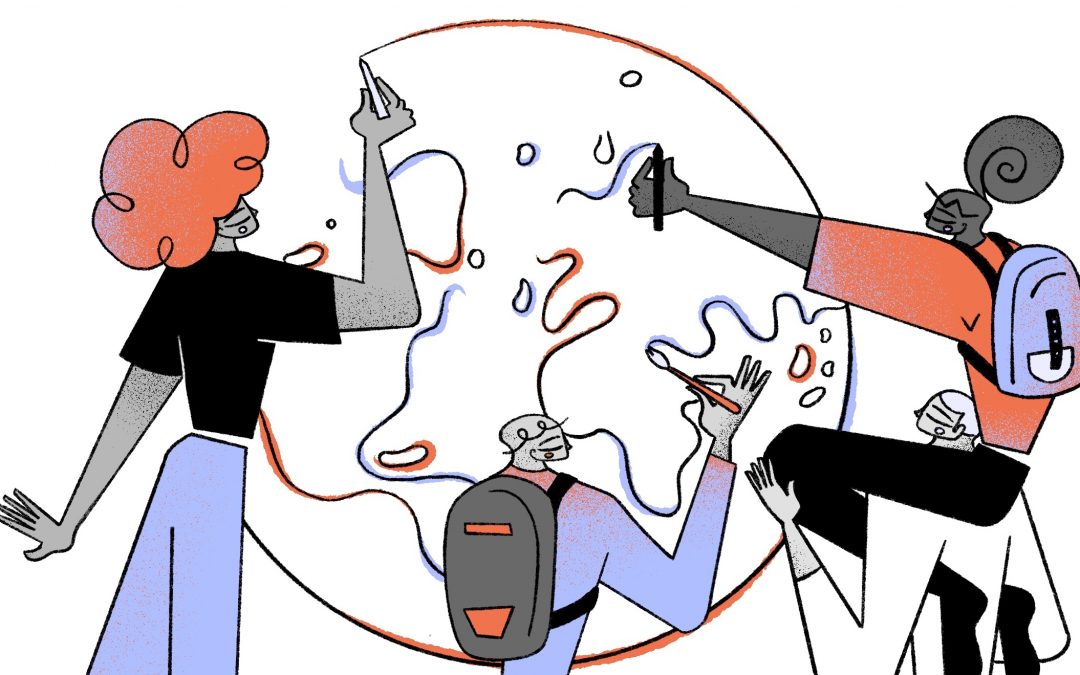
Post Script

Humanities Take the Spotlight
A community-wide project conceived at Milton highlights the importance of the humanities to a robust society
By Alisa Braithwaite, co-founder and co-director, Humanities Project; and Melissa Figueroa, interim co-director, Humanities Project
Illustration by Fernando Cobelo
We began the Humanities Workshop with a worry and a wish. Our worry: The STEM-focused trend in secondary education would diminish the relevance of the humanities in our students’ lives. STEM lends itself to student inquiry and project-based units preparing students for the available jobs after school and addressing the problems they would inherit as adults. But as schools put more resources into these fields, what would be left for the humanities? Did literature, history, and the arts play no part in career development and problem-solving? Could issues like poverty and climate change be solved without considering their historical and human contexts? And what about issues that cannot be codified, such as race relations or religious strife? How would our students understand how to approach these conflicts without the humanities at the forefront of their education? Our wish: to find a way for the humanities to capture the imagination of our students and our administrators in the same way that the STEM fields have. How might we highlight how humanities courses, too, center student inquiry and project-based learning, allowing students to see the change they can make in their communities through their work in the humanities?
Inspired by The Humanities Action Lab, a coalition of universities, issue organizations, and public spaces that collaborate to produce public humanities projects on urgent social issues throughout the country, we wondered if it would be possible to do something similar on the secondary school level.
We were heartened by how willing teachers were to take this challenge on. In our own community we found connections to Boston Latin School, Boston College High School, Boston Collegiate Charter School, and the Academy of the Pacific Rim our first year. We brought 22 teachers to campus to discuss our first theme—economic inequality— and watched while a professional scriber made our thoughts visual: It was happening! Together, teachers were creating an opportunity for our humanities students to think differently. When we saw what 1,000 students produced that first cycle, displayed in the magnificent atrium of the Edward M. Kennedy Institute, our wish seemed to come true.
But our key takeaway was the need to get students to talk across schools. It was all well and good to have them work in their silos and then present together, but what conversations were they having with each other from their varying perspectives? This question continues to drive each iteration of the Workshop, but the second iteration made it feel nearly impossible to answer.
COVID arrived, and we wondered if we could go on. We were still new and now couldn’t be in the same space with our own students let alone students in other schools. But those difficulties became a call to action: If the Humanities Workshop could happen when we were so far apart, wouldn’t we also show why the Humanities Workshop needed to exist? The humanities exist to support community: They tell our stories, help us to see, question, and express ourselves to others. Although we were physically separated, technology—our former nemesis—allowed us to reconnect our communities and continue telling our stories.
The climate crisis was our theme, and technology brought us together more often than meeting in person. A mid-year panel, hosted by recent alum Edward Moreta ’18, featured local experts in climate change and climate justice. Journalist David Abel shared his film about the right whale’s possible extinction and met with students in a virtual talkback about the intersection between working-class livelihoods and environmental protections. The platform Envoys helped us host a virtual conference where students from participating schools showcased work and fielded one another’s questions. In spite of our physical distance, students were talking across schools, and they were taking the lead.
After seeing the inequality that COVID highlighted, and the mental suffering of students in remote and hybrid environments, our teachers chose public health as our next theme. Boston International Newcomers Academy (BINCA) was able to fully participate, and John D. O’Bryant School of Mathematics and Science, also public, joined the consortium. For this iteration, we hosted our mid-year panel in-person at Boston College High School and returned to the Edward M. Kennedy Institute with the conference model that centered our students’ voices. The keynote, by Dr. Bisola Ojikutu, executive director of the Boston Health Commission, provided further inspiration for the students.
This year, we are five, and we know that we’ve built something that others want to be part of. In less than a year, a presidential election may change our democracy’s trajectory, so we’ve chosen democracy for our next theme. We must admit: in pursuit of our wish, we’ve discovered that the humanities do not solve our problems, but to ask them to do that is to misunderstand them. The humanities, as our students now understand, exist so that we can see our problems with clarity, empathy, and purpose. They are why the work matters at all.
Alisa Braithwaite and Melissa Figueroa are both members of Milton’s English Department faculty. The Humanities Workshop was co-founded and is co-directed by English faculty member Lisa Baker.




